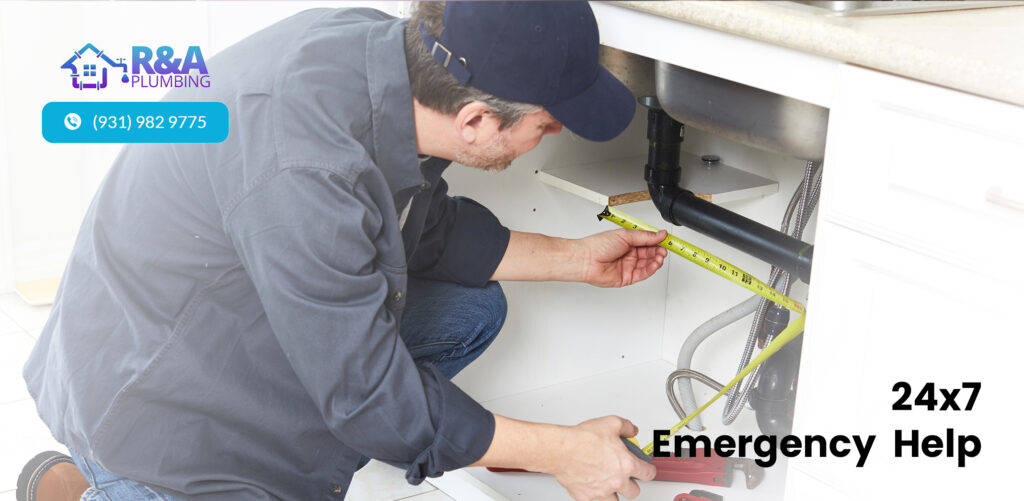A burst pipe in the middle of the night is not an ideal scenario we all dream of. It is rather a nightmare we find difficult to handle. However, once you get a basic understanding of how to address these plumbing emergencies, you can deal with the stress and frustration of this nightmare in a more composed manner.
Whether it’s a burst pipe, a clogged drain, or a malfunctioning water heater, knowing how to deal with these emergencies can save you time and money and understand how to stop any potential damage to your property.
But how?
In this guide, we’ll cover the most common plumbing emergencies and provide step-by-step instructions on handling them effectively.
Immediate Response
What happens when you face a plumbing emergency? This is an important question you must be able to answer in order to minimize damage and complications in case of plumbing failures.
Here are some points you can keep in mind:
Shut Off the Water
In case of any plumbing emergency, locate the main water shutoff valve and turn it off to stop the flow of water to the affected area and its surroundings.
Assess the Situation
Try to assess the extent of the damage and identify any safety hazards. Look out for electrical outlets near water or gas leaks and try to turn them off.
Call for Professional Help
It is important to keep the contact information of an emergency plumber handy at all times. You never know when a plumbing emergency will knock on your door, and your best bet in such situations is to have us—your trusted licensed plumber—by your side. We are available 24/7 to cater to your plumbing needs and respond to them in a timely and efficient manner.
Step-by-step Guide To Common Plumbing Emergencies
Plumbing emergencies can vary in severity, from minor leaks to major floods. Understanding the different types of emergencies and knowing how to deal with them is important.
Burst Pipes
Sudden changes in temperature, corrosion, or high water pressure can lead to burst pipes and serious water damage. You need to be proactive in detecting the issue and reaching out to us for immediate plumbing assistance.
Before we arrive: here’s how you can handle Burst Pipes:
- Turn off the water supply.
- Drain the pipes by turning on all faucets.
- Locate the burst pipe and patch it temporarily.
- Reach out to us for permanent repairs
Clogged Drains
The build-up of oil, grease, hair, or soap scum can cause clogged drains. This can lead to water backups and unpleasant odors. While clogged drains might not appear to be serious, they can cause issues in the long run. The smartest way to deal with drain blockageis to hand it over to our plumbing experts.
Here’s how you can deal with clogged drains before we arrive:
- Try to clear the blockage using a plunger or a plumbing snake.
- Use natural remedies like baking soda, vinegar, or commercial drain cleaners.
- If the blockage still persists, avoid using the affected fixtures and call us for immediate assistance.
Water Heater Malfunctions
Hot water is a daily need, and the absence of it can disrupt your convenience and comfort. Issues with water heaters are a common occurrence and can lead to leaks or even explosions if the pressure builds up excessively. If you feel like you need any help with your water heater, you can call our plumbing services to assess, identify, and repair your problem in a short amount of time.
Here’s how you can handle Water Heater Malfunctions before our team arrives:
- Turn off the power or gas supply to the water heater.
- Inspect for leaks and assess the severity of the damage.
- Look for the manufacturer’s instructions and follow them for troubleshooting.
- Contact us instantly for professional water heater repair.
Toilet Overflows
Blockages in the toilet trap or sewer line can cause the toilets to overflow, ultimately causing health hazards and property damage. While such situations can cause you a lot of distress, our plumbing experts are here to help you with emergency repairs to uphold the vitality of your plumbing system.
Here are some steps you can take before we arrive:
- Stop the overflow by turning off the toilet’s water supply valve.
- Use a plunger and try to clear the blockage.
- If the toilet still continues to overflow, avoid flushing and call us immediately.
Preventative Measures
While emergencies are unavoidable at times, there are some steps you can take to minimize the risk of plumbing issues in the future:
Regular Maintenance
Schedule periodic inspections and maintenance for your plumbing system to catch potential problems early.
Proper Usage
Make sure you do not flush non-biodegradable items down the toilet and dispose of grease properly to prevent clogs.
Insulation
Insulate pipes during winter to prevent freezing and bursting during winter.
Emergency Preparedness
Make sure you have all essential plumbing tools, such as plungers, sewer snakes, and pipe wrenches, and always stay informed of the location of your main water shutoff valve.
By taking preventative measures and knowing how to respond to emergencies, you can safeguard your property and make sure the safety and comfort of your family are maintained.
Handling plumbing emergencies can be stressful, but with proactive response, you can effectively deal with them and minimize damage to your home. All you need to remember is the golden rule – to stay calm, assess the situation, and seek professional help when needed. At R&A Plumbing, we are available 24/7 to offer immediate help and expert consultation to maintain a healthy plumbing system.

